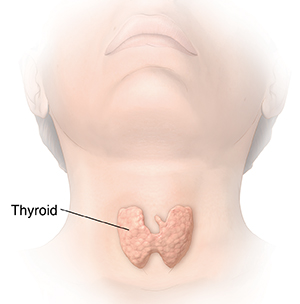You have been diagnosed with hypothyroidism. This means your thyroid gland doesn't make enough thyroid hormone. This hormone is vital to body growth and metabolism. If you don’t make enough, many body processes slow down. This can cause symptoms. Hypothyroidism can range from mild to severe. The most severe form is called myxedema coma.
There are many causes of hypothyroidism. A common cause is Hashimoto’s thyroiditis. This is a disease that causes the immune system to attack the thyroid gland. Other causes include:
-
Radiation to the thyroid gland
-
Surgery to remove the thyroid gland
-
Not enough hormones from the pituitary gland
-
Medicines such as lithium or amiodarone
Symptoms of hypothyroidism can include:
-
Fatigue
-
Trouble concentrating, thinking clearly, or remembering
-
Dry skin
-
Hair loss
-
Weight gain
-
Low tolerance to cold
-
Constipation
-
Depression
-
Personality changes
-
Tingling or prickling of the hands or feet
-
Heavy, absent, or irregular periods
Older adults may sometimes have other symptoms. These can include:
-
Muscle aches and weakness
-
Confusion
-
Problems controlling urine or stool (incontinence)
-
Trouble moving around
-
Falling
Treatment for hypothyroidism is done by taking thyroid hormone pills daily. These pills replace the hormone your thyroid doesn’t make. You'll likely need to take a daily pill for the rest of your life. Tips for taking this medicine are below.
Home care
Tips for taking your medicine
-
Take your thyroid hormone pills exactly as prescribed. This is most often 1 pill a day on an empty stomach. Use a pillbox labeled with the days of the week. This will help you remember to take your pill each day.
-
Don’t take iron, calcium, or antacids within 4 hours of taking your thyroid hormone pills.
-
Don’t take other medicines with your thyroid hormone pill without checking with your provider first.
-
Tell your provider if you have any side effects from your medicines.
-
Don't change the dose or stop taking your thyroid pills without discussing with your healthcare provider.
General care
-
Always talk with your provider before trying other treatments for your thyroid.
-
Tell all of your healthcare providers you have hypothyroidism.
-
Tell your provider if you get pregnant. Your dose of thyroid hormone may need to be changed.
Follow-up care
See your provider for checkups as advised. You'll need regular tests to check the level of thyroid hormone in your blood.
When to get medical care
Call your healthcare provider right away if you have any of these:
-
New symptoms
-
Symptoms that return, continue, or get worse even with treatment
-
Extreme fatigue
-
Puffy hands, face, or feet
-
Fast or irregular heartbeat
-
Confusion
Call 911
Call
-
Fainting
-
Chest pain
-
Shortness of breath or trouble breathing


